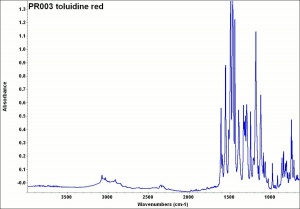Difference between revisions of "Hansa red"
Jump to navigation
Jump to search
m (Text replace - "== Authority ==" to "== Sources Checked for Data in Record ==") |
|||
| Line 19: | Line 19: | ||
Ingestion can cause cyanosis. Suspected carcinogen. | Ingestion can cause cyanosis. Suspected carcinogen. | ||
| − | == | + | == Sources Checked for Data in Record == |
* Richard S. Lewis, ''Hawley's Condensed Chemical Dictionary'', Van Nostrand Reinhold, New York, 10th ed., 1993 | * Richard S. Lewis, ''Hawley's Condensed Chemical Dictionary'', Van Nostrand Reinhold, New York, 10th ed., 1993 | ||
Revision as of 06:07, 1 May 2016
Description
Originally a Hoechst AG trademark for a line of bright, transparent red synthetic organic pigments. Hansa reds, also called toluidine reds, are based on the reaction of beta-naphthol with 2-nitro-4-toluidine. Toluidine red was first synthesized in 1905. In general, toluidine reds have fair lightfastness and weather resistance, and they have a tendency to bleed. They are used in industrial coatings for air-dried and baked enamels and auto finishes. Toluidine reds are also used in wax crayons, pastels and watercolors.
See also Hansa.
Synonyms and Related Terms
toluidine red; Pigment Red 3; CI 12120
Other Properties
Soluble in many organic solvents. Resistant to acid, alkali and soap.
Hazards and Safety
Ingestion can cause cyanosis. Suspected carcinogen.
Sources Checked for Data in Record
- Richard S. Lewis, Hawley's Condensed Chemical Dictionary, Van Nostrand Reinhold, New York, 10th ed., 1993
- Michael McCann, Artist Beware, Watson-Guptill Publications, New York City, 1979
- Monona Rossol, The Artist's Complete Health and Safety Guide, Allworth Press, New York, 1994
- B. Berrie, S.Q. Lomax, 'Azo Pigments: Their History, Synthesis, Properties and Use in Artists' Materials', Studies in the History of Art , National Gallery of Art, Washington DC, No. 57, 1997
